How to stop redirects to scam websites
Phishing/ScamAlso Known As: "Outdated browser detected" virus
Get free scan and check if your device is infected.
Remove it nowTo use full-featured product, you have to purchase a license for Combo Cleaner. Seven days free trial available. Combo Cleaner is owned and operated by RCS LT, the parent company of PCRisk.com.
What is "Outdated browser detected"?
"Outdated browser detected" is a scam that advises computer users to update their browsers to the latest versions. These sites cannot be trusted, since scammers use them to trick people into downloading and installing potentially unwanted applications (PUAs) or visiting dubious web pages that might also be designed to promote PUAs.
Furthermore, the sites are generally opened by PUAs already installed on the system. Therefore, do not trust this or other similar sites. More importantly, do not to download the applications that they promote.
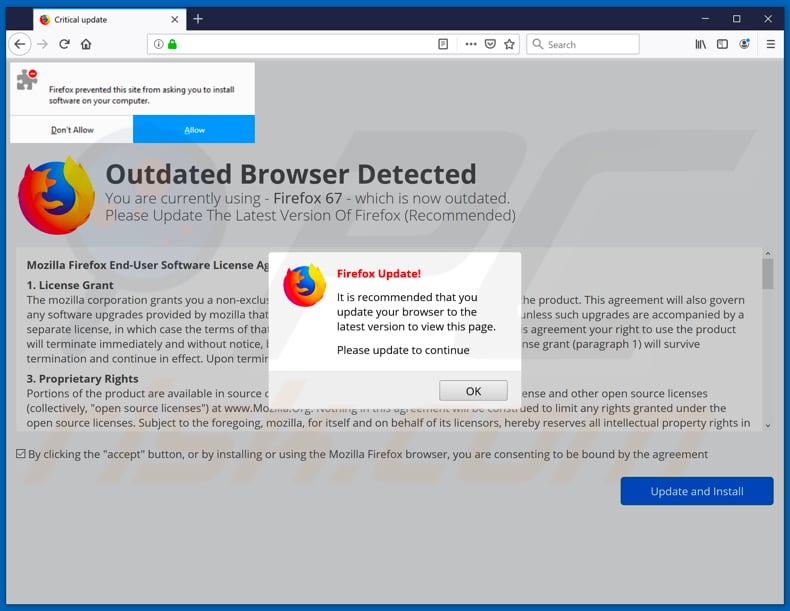
This scam might occur on different browsers, including Mozilla Firefox, Google Chrome, Internet Explorer, and so on. By agreeing to update the browser, people might be redirected to a dubious, potentially malicious site or download a fake installer/updater.
If launched, these set-ups install PUAs - various system optimizers such as Adroit System Care, mBytes System Care, etc. or apps such as browser hijackers and adware. Browser hijackers change browser settings and force users to open a dubious URL (typically, of a fake search engine). T
hey also gather information such as, for example, IP addresses, geolocations, addresses of visited sites, entered search queries, etc. Developers share the data with third parties (potentially, cyber criminals). Both parties misuse the details to generate revenue.
Some of the information might contain sensitive details. Adware-type apps can also be designed to collect data, however, their main purpose is to display various annoying and dubious advertisements. They show coupons, banners, pop-up ads, surveys, and so on.
When clicked, these ads cause download/installation of unwanted apps or open potentially malicious web pages. Therefore, clicking them is not advisable.
No matter what the purpose of the "Outdated browser detected" scam, it should not be trusted. If it cannot be removed by closing the window or tab, we recommend that you close the entire browser process through Task Manager. Note: do not reopen the closed browsing session, since this will return you to the scam site.
| Name | "Outdated browser detected" virus |
| Threat Type | Phishing, Scam, Social Engineering, Fraud. |
| Fake Claim | This scam claims that the browser is outdated and encourages users to update it. |
| Distributed Unwanted Apps | Possible browser hijackers, adware, and other unwanted applications. |
| Detection Names (apelorissedwen[.]download) | Full List Of Detections (VirusTotal) |
| Serving IP Address (apelorissedwen[.]download) | 104.27.135.187 |
| Symptoms | Fake error messages, fake system warnings, pop-up errors, hoax computer scan, fake update notifications |
| Distribution methods | Compromised websites, rogue online pop-up ads, potentially unwanted applications. |
| Damage | Installation of unwanted applications, loss of sensitive and private information, monetary loss, identity theft, possible malware infections. |
| Malware Removal (Windows) |
To eliminate possible malware infections, scan your computer with legitimate antivirus software. Our security researchers recommend using Combo Cleaner. Download Combo CleanerTo use full-featured product, you have to purchase a license for Combo Cleaner. 7 days free trial available. Combo Cleaner is owned and operated by RCS LT, the parent company of PCRisk.com. |
There are many scam sites on the web. These are often used to trick people into downloading and installing PUAs or contacting scammers via a displayed telephone number. Some examples of other scam websites include "Error # 0x80092ee9", "Your Windows Computer Could Be Infected With Viruses!", and "Microsoft Detected Malicious Virus And Blocked Your Computer".
Typically, people arrive at them through clicked dubious ads or other rogue website, or due to PUAs already installed on the system. Many PUAs are designed to cause redirects to dubious web pages.
How did potentially unwanted applications install on my computer?
People generally download and install PUAs through intrusive advertisements or due to developers who use a deceptive marketing method called "bundling". They use "Bundling" to trick people into downloading and installing unwanted programs together with regular software.
They include PUAs into the set-ups of regular software (typically, these programs are free), however, they do not disclose this information properly.
They hide information pertaining to these additional apps in "Custom", "Advanced", "Manual" and other similar settings/sections of the download and installation set-ups. In summary, developers succeed when people download and install programs without checking options included the set-ups.
How to avoid installation of potentially unwanted applications?
Avoid using third party software downloaders and installers to download/install software. Do not download programs using Peer-to-Peer networks, dubious sites, etc. Download software from official and trustworthy websites/sources.
Opt-out of any unwanted apps (these can usually be found in "Custom", "Advanced", and other similar sections) before completing the download or installation. Avoid clicking intrusive ads, even if they seem legitimate. They often cause redirects to potentially malicious websites relating to gambling, pornography, adult dating, and so on.
To stop the browser from causing unwanted redirects or displaying ads, uninstall all unwanted, suspicious extensions, plug-ins, and add-ons from the browser and programs from the computer. If your computer is already infected with PUAs, we recommend running a scan with Combo Cleaner Antivirus for Windows to automatically eliminate them.
The appearance of "Outdated browser detected" pop-up (GIF):
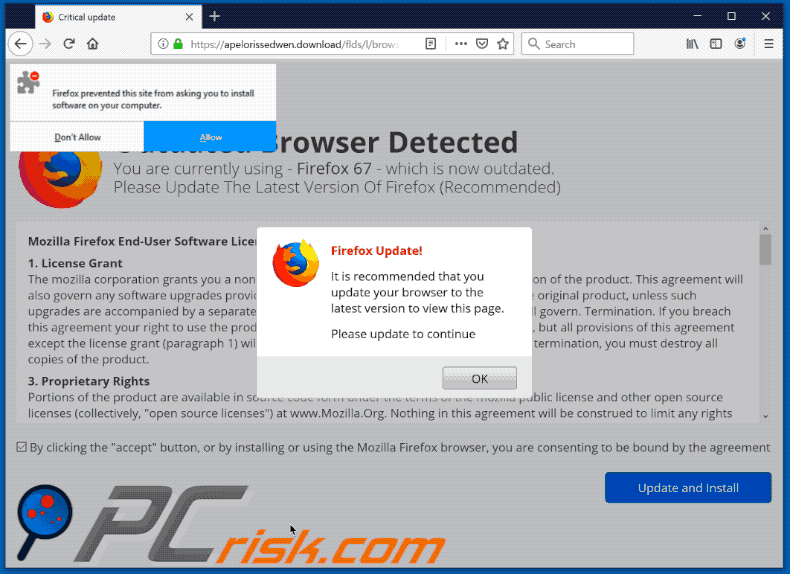
Text presented in the pop-up window:
Outdated Browser Detected
You are currently using - Firefox 67 - which is not outdated.
Please Update The Latest Version of Firefox (recommended)It is recommended that you update your browser to the lates version to view this page. Please update to continue.
IMPORTANT NOTE! This deceptive site asks to enable web browser notifications.
Therefore, before commencing, perform these steps:
Google Chrome (PC):
- Click the Menu button (three dots) on the right upper corner of the screen
- Select "Settings", scroll down to the bottom and click "Advanced"
- Scroll down to the "Privacy and security" section, select "Content settings" and then "Notifications"
- Click three dots on the right hand side of each suspicious URL and click "Block" or "Remove" (if you click "Remove" and visit the malicious site once more, it will ask to enable notifications again)
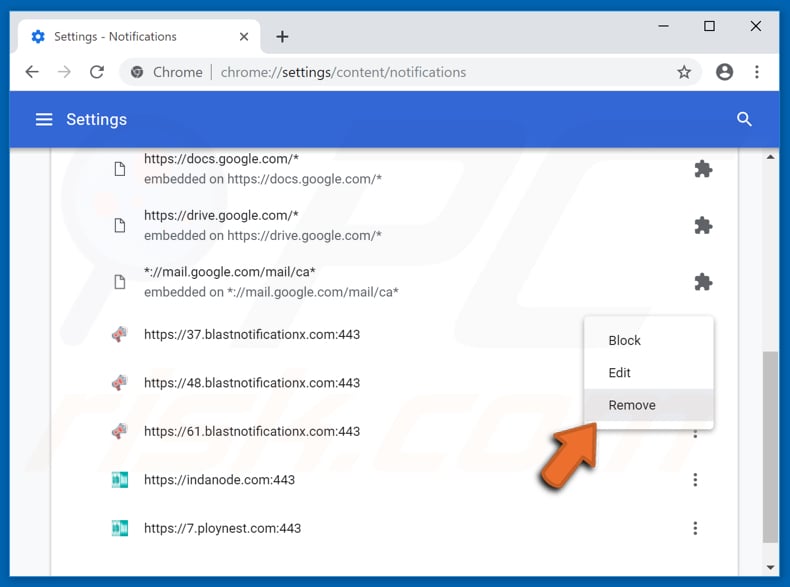
Google Chrome (Android):
- Click on the Menu button (three dots) on the right upper corner of the screen and click "Settings"
- Scroll down, click on "Site settings" and then "Notifications"
- In the opened window, locate all suspicious URLs and click on them one-by-one
- Select "Notifications" in the "Permissions" section and set the toggle button to "OFF"
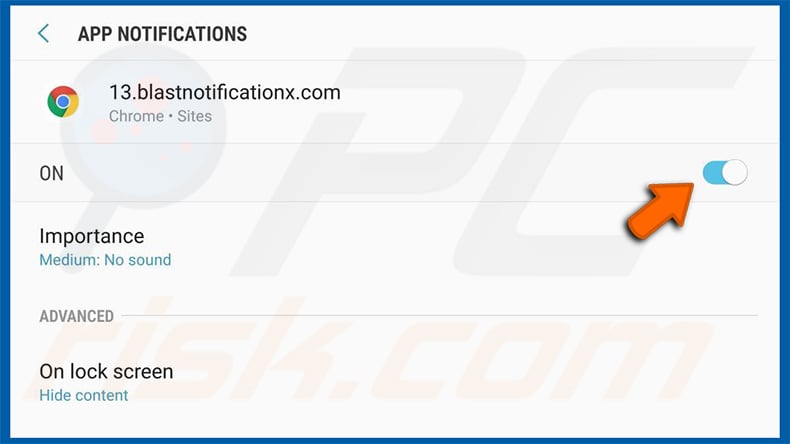
Mozilla Firefox:
- Click the Menu button (three bars) on the right upper corner of the screen
- Select "Options" and click on "Privacy & Security" in the toolbar on the left hand side of the screen
- Scroll down to the "Permissions" section and click the "Settings" button next to "Notifications"
- In the opened window, locate all suspicious URLs, click the drop-down menu and select "Block"
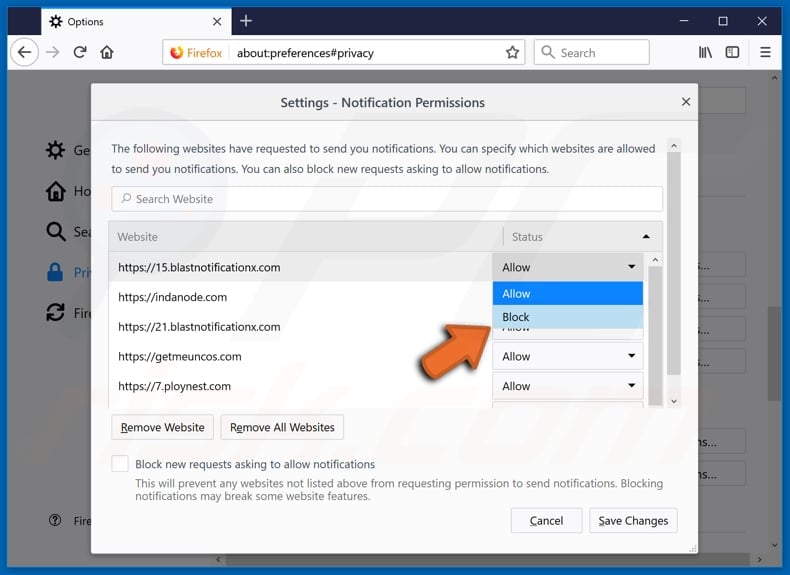
Internet Explorer:
- Click the Gear button on the right upper corner of the IE window
- Select "Internet options"
- Select the "Privacy" tab and click "Settings" under "Pop-up Blocker" section
- Select suspicious URLs under and remove them one by one by clicking the "Remove" button
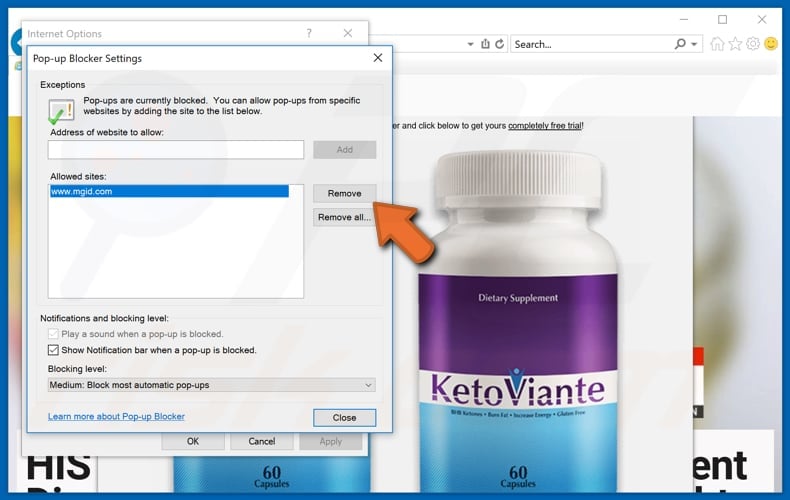
Microsoft Edge:
- Click the menu button (three dots) on the right upper corner of the Edge window
- Scroll down, find and click "Settings"
- Scroll down again and click "View advanced settings"
- Click "Manage" under "Website permissions"
- Click the switch under each suspicious website
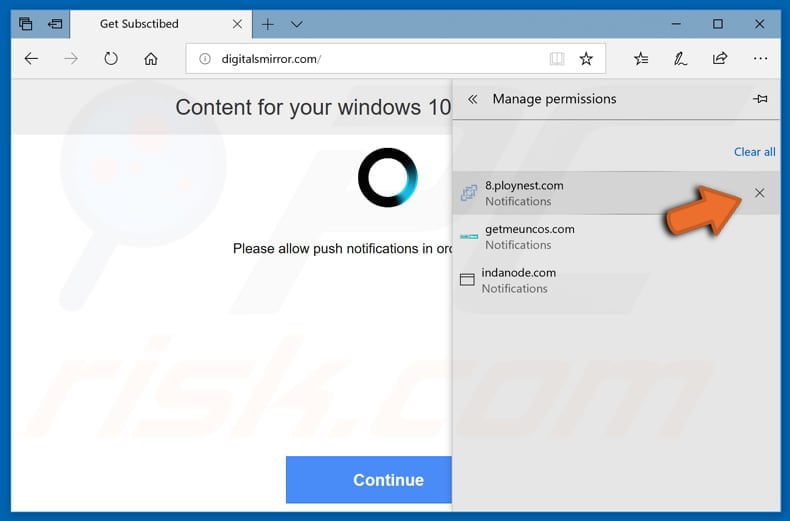
Safari (Mac):
- Click "Safari" button on the left upper corner of the screen and select "Preferences..."
- Select the "Websites" tab and then select "Notifications" section on the left pane
- Check for suspicious URLs and apply the "Deny" option for each
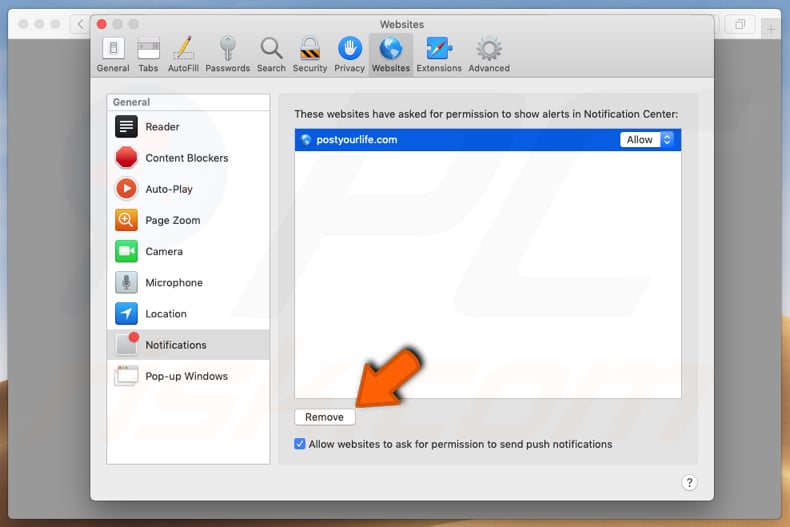
Instant automatic malware removal:
Manual threat removal might be a lengthy and complicated process that requires advanced IT skills. Combo Cleaner is a professional automatic malware removal tool that is recommended to get rid of malware. Download it by clicking the button below:
DOWNLOAD Combo CleanerBy downloading any software listed on this website you agree to our Privacy Policy and Terms of Use. To use full-featured product, you have to purchase a license for Combo Cleaner. 7 days free trial available. Combo Cleaner is owned and operated by RCS LT, the parent company of PCRisk.com.
Quick menu:
- What is "Outdated browser detected" virus?
- How to identify a pop-up scam?
- How do pop-up scams work?
- How to remove fake pop-ups?
- How to prevent fake pop-ups?
- What to do if you fell for a pop-up scam?
How to identify a pop-up scam?
Pop-up windows with various fake messages are a common type of lures cybercriminals use. They collect sensitive personal data, trick Internet users into calling fake tech support numbers, subscribe to useless online services, invest in shady cryptocurrency schemes, etc.
While in the majority of cases these pop-ups don't infect users' devices with malware, they can cause direct monetary loss or could result in identity theft.
Cybercriminals strive to create their rogue pop-up windows to look trustworthy, however, scams typically have the following characteristics:
- Spelling mistakes and non-professional images - Closely inspect the information displayed in a pop-up. Spelling mistakes and unprofessional images could be a sign of a scam.
- Sense of urgency - Countdown timer with a couple of minutes on it, asking you to enter your personal information or subscribe to some online service.
- Statements that you won something - If you haven't participated in a lottery, online competition, etc., and you see a pop-up window stating that you won.
- Computer or mobile device scan - A pop-up window that scans your device and informs of detected issues - is undoubtedly a scam; webpages cannot perform such actions.
- Exclusivity - Pop-up windows stating that only you are given secret access to a financial scheme that can quickly make you rich.
Example of a pop-up scam:

How do pop-up scams work?
Cybercriminals and deceptive marketers usually use various advertising networks, search engine poisoning techniques, and shady websites to generate traffic to their pop-ups. Users land on their online lures after clicking on fake download buttons, using a torrent website, or simply clicking on an Internet search engine result.
Based on users' location and device information, they are presented with a scam pop-up. Lures presented in such pop-ups range from get-rich-quick schemes to fake virus scans.
How to remove fake pop-ups?
In most cases, pop-up scams do not infect users' devices with malware. If you encountered a scam pop-up, simply closing it should be enough. In some cases scam, pop-ups may be hard to close; in such cases - close your Internet browser and restart it.
In extremely rare cases, you might need to reset your Internet browser. For this, use our instructions explaining how to reset Internet browser settings.
How to prevent fake pop-ups?
To prevent seeing pop-up scams, you should visit only reputable websites. Torrent, Crack, free online movie streaming, YouTube video download, and other websites of similar reputation commonly redirect Internet users to pop-up scams.
To minimize the risk of encountering pop-up scams, you should keep your Internet browsers up-to-date and use reputable anti-malware application. For this purpose, we recommend Combo Cleaner Antivirus for Windows.
What to do if you fell for a pop-up scam?
This depends on the type of scam that you fell for. Most commonly, pop-up scams try to trick users into sending money, giving away personal information, or giving access to one's device.
- If you sent money to scammers: You should contact your financial institution and explain that you were scammed. If informed promptly, there's a chance to get your money back.
- If you gave away your personal information: You should change your passwords and enable two-factor authentication in all online services that you use. Visit Federal Trade Commission to report identity theft and get personalized recovery steps.
- If you let scammers connect to your device: You should scan your computer with reputable anti-malware (we recommend Combo Cleaner Antivirus for Windows) - cyber criminals could have planted trojans, keyloggers, and other malware, don't use your computer until removing possible threats.
- Help other Internet users: report Internet scams to Federal Trade Commission.
Share:

Tomas Meskauskas
Expert security researcher, professional malware analyst
I am passionate about computer security and technology. I have an experience of over 10 years working in various companies related to computer technical issue solving and Internet security. I have been working as an author and editor for pcrisk.com since 2010. Follow me on Twitter and LinkedIn to stay informed about the latest online security threats.
PCrisk security portal is brought by a company RCS LT.
Joined forces of security researchers help educate computer users about the latest online security threats. More information about the company RCS LT.
Our malware removal guides are free. However, if you want to support us you can send us a donation.
DonatePCrisk security portal is brought by a company RCS LT.
Joined forces of security researchers help educate computer users about the latest online security threats. More information about the company RCS LT.
Our malware removal guides are free. However, if you want to support us you can send us a donation.
Donate
▼ Show Discussion